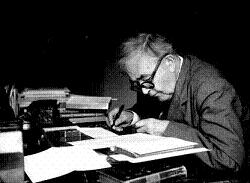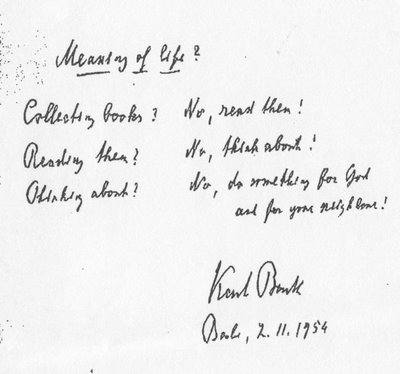二十世紀三十年代初,德國境內許多基督徒受強烈的民族意識薰陶,對希特拉的當權充滿期望。希特拉早年更揚言要團結德國的基督教會,並建立「正面的基督教」( positive Christianity ),博得不少基督徒支持。因此,當時「德國福音教會」( German Evangelical Church )內洋溢一片擁護納粹政權的呼聲。早於1932年,一群親納粹的國家社會主義基督徒已成立「福音基督教」( Evangelical Nazis )黨派;後來在希特拉推波助瀾下,正式改名「德國基督教」( German Christians ),在全國教會議會中,迅速取得三分之一議席,成為日後希特拉統一及操控全國基督教團體的政治工具。
「德國基督教」成為希特拉國家社會主義下的傀儡。他們主張德意志是上帝新揀選的民族;而希特拉則是德國的彌賽亞,也是上帝拯救德國的啟示。 當時,好些基督徒對「德國基督教」的信仰教義及宗教政策深感不滿,遂集結成一股宗教性的抗議力量,形成日後所謂的「認信教會」群體。
1934 年 5 月中旬,巴特與另外兩位神學家,在法蘭克福草擬一份神學共同認信宣言。於同月31 日的「巴門會議」(Barmen Synod)上,這份宣言由139 位來自18間認信教會的代表通過採納,成為認信教會的重要神學依據,稱之為《巴門宣言》。【參 納粹德國下的「認信教會」(1933-1945)】
Theological Declaration of Barmen
I. An Appeal to the Evangelical Congregations and Christians in Germany
The Confessional Synod of the German Evangelical Church met in Barmen, May 29-31, 1934. Here representatives from all the German Confessional Churches met with one accord in a confession of the one Lord of the one, holy, apostolic Church. In fidelity to their Confession of Faith, members of Lutheran, Reformed, and United Churches sought a common message for the need and temptation of the Church in our day. With gratitude to God they are convinced that they have been given a common word to utter. It was not their intention to found a new Church or to form a union. For nothing was farther from their minds than the abolition of the confessional status of our Churches. Their intention was, rather, to withstand in faith and unanimity the destruction of the Confession of Faith, and thus of the Evangelical Church in Germany. In opposition to attempts to establish the unity of the German Evangelical Church by means of false doctrine, by the use of force and insincere practices, the Confessional Synod insists that the unity of the Evangelical Churches in Germany can come only from the Word of God in faith through the Holy Spirit. Thus alone is the Church renewed.
Therefore the Confessional Synod calls upon the congregations to range themselves behind it in prayer, and steadfastly to gather around those pastors and teachers who are loyal to the Confessions.
Be not deceived by loose talk, as if we meant to oppose the unity of the German nation! Do not listen to the seducers who pervert our intentions, as if we wanted to break up the unity of the German Evangelical Church or to forsake the Confessions of the Fathers!
Try the spirits whether they are of God! Prove also the words of the Confessional Synod of the German Evangelical Church to see whether they agree with Holy Scripture and with the Confessions of the Fathers. If you find that we are speaking contrary to Scripture, then do not listen to us! But if you find that we are taking our stand upon Scripture, then let no fear or temptation keep you from treading with us the path of faith and obedience to the Word of God, in order that God's people be of one mind upon earth and that we in faith experience what he himself has said: "I will never leave you, nor forsake you." Therefore, "Fear not, little flock, for it is your Father's good pleasure to give you the kingdom."
II. Theological Declaration Concerning the Present Situation of the German Evangelical Church
According to the opening words of its constitution of July 11, 1933, the German Evangelical Church is a federation of Confessional Churches that grew out of the Reformation and that enjoy equal rights. The theological basis for the unification of these Churches is laid down in Article 1 and Article 2(1) of the constitution of the German Evangelical Church that was recognized by the Reich Government on July 14, 1933:
- Article 1. The inviolable foundation of the German Evangelical Church is the gospel of Jesus Christ as it is attested for us in Holy Scripture and brought to light again in the Confessions of the Reformation. The full powers that the Church needs for its mission are hereby determined and limited.
- Article 2 (1). The German Evangelical Church is divided into member Churches (Landeskirchen).
We, the representatives of Lutheran, Reformed, and United Churches, of free synods, Church assemblies, and parish organizations united in the Confessional Synod of the German Evangelical Church, declare that we stand together on the ground of the German Evangelical Church as a federation of German Confessional Churches. We are bound together by the confession of the one Lord of the one, holy, catholic, and apostolic Church.
We publicly declare before all evangelical Churches in Germany that what they hold in common in this Confession is grievously imperiled, and with it the unity of the German Evangelical Church. It is threatened by the teaching methods and actions of the ruling Church party of the "German Christians" and of the Church administration carried on by them. These have become more and more apparent during the first year of the existence of the German Evangelical Church. This threat consists in the fact that the theological basis, in which the German Evangelical Church is united, has been continually and systematically thwarted and rendered ineffective by alien principles, on the part of the leaders and spokesmen of the "German Christians" as well as on the part of the Church administration. When these principles are held to be valid, then, according to all the Confessions in force among us, the Church ceases to be the Church and the German Evangelical Church, as a federation of Confessional Churches, becomes intrinsically impossible.
As members of Lutheran, Reformed, and United Churches we may and must speak with one voice in this matter today. Precisely because we want to be and to remain faithful to our various Confessions, we may not keep silent, since we believe that we have been given a common message to utter in a time of common need and temptation. We commend to God what this may mean for the interrelations of the Confessional Churches.
In view of the errors of the "German Christians" of the present Reich Church government which are devastating the Church and also therefore breaking up the unity of the German Evangelical Church, we confess the following evangelical truths:
1. "I am the way, and the truth, and the life; no one comes to the Father, but by me." (John 14.6). "Truly, truly, I say to you, he who does not enter the sheepfold by the door, but climbs in by another way, that man is a thief and a robber. . . . I am the door; if anyone enters by me, he will be saved." (John 10:1, 9.)
Jesus Christ, as he is attested for us in Holy Scripture, is the one Word of God which we have to hear and which we have to trust and obey in life and in death.
We reject the false doctrine, as though the church could and would have to acknowledge as a source of its proclamation, apart from and besides this one Word of God, still other events and powers, figures and truths, as God's revelation.
2. "Christ Jesus, whom God has made our wisdom, our righteousness and sanctification and redemption." (1 Cor. 1:30.)
As Jesus Christ is God's assurance of the forgiveness of all our sins, so, in the same way and with the same seriousness he is also God's mighty claim upon our whole life. Through him befalls us a joyful deliverance from the godless fetters of this world for a free, grateful service to his creatures.
We reject the false doctrine, as though there were areas of our life in which we would not belong to Jesus Christ, but to other lords—areas in which we would not need justification and sanctification through him.
3. "Rather, speaking the truth in love, we are to grow up in every way into him who is the head, into Christ, from whom the whole body [is] joined and knit together." (Eph. 4:15,16.)
The Christian Church is the congregation of the brethren in which Jesus Christ acts presently as the Lord in Word and sacrament through the Holy Spirit. As the Church of pardoned sinners, it has to testify in the midst of a sinful world, with its faith as with its obedience, with its message as with its order, that it is solely his property, and that it lives and wants to live solely from his comfort and from his direction in the expectation of his appearance.
We reject the false doctrine, as though the Church were permitted to abandon the form of its message and order to its own pleasure or to changes in prevailing ideological and political convictions.
4. "You know that the rulers of the Gentiles lord it over them, and their great men exercise authority over them. It shall not be so among you; but whoever would be great among you must be your servant." (Matt. 20:25,26.)
The various offices in the Church do not establish a dominion of some over the others; on the contrary, they are for the exercise of the ministry entrusted to and enjoined upon the whole congregation.
We reject the false doctrine, as though the Church, apart from this ministry, could and were permitted to give itself, or allow to be given to it, special leaders vested with ruling powers.
5. "Fear God. Honor the emperor." (1 Peter 2:17.)
Scripture tells us that, in the as yet unredeemed world in which the Church also exists, the State has by divine appointment the task of providing for justice and peace. [It fulfills this task] by means of the threat and exercise of force, according to the measure of human judgment and human ability. The Church acknowledges the benefit of this divine appointment in gratitude and reverence before him. It calls to mind the Kingdom of God, God's commandment and righteousness, and thereby the responsibility both of rulers and of the ruled. It trusts and obeys the power of the Word by which God upholds all things.
We reject the false doctrine, as though the State, over and beyond its special commission, should and could become the single and totalitarian order of human life, thus fulfilling the Church's vocation as well.
We reject the false doctrine, as though the Church, over and beyond its special commission, should and could appropriate the characteristics, the tasks, and the dignity of the State, thus itself becoming an organ of the State.
6. "Lo, I am with you always, to the close of the age." (Matt. 28:20.) "The word of God is not fettered." (2 Tim. 2:9.)
The Church's commission, upon which its freedom is founded, consists in delivering the message of the free grace of God to all people in Christ's stead, and therefore in the ministry of his own Word and work through sermon and sacrament.
We reject the false doctrine, as though the Church in human arrogance could place the Word and work of the Lord in the service of any arbitrarily chosen desires, purposes, and plans.
The Confessional Synod of the German Evangelical Church declares that it sees in the acknowledgment of these truths and in the rejection of these errors the indispensable theological basis of the German Evangelical Church as a federation of Confessional Churches. It invites all who are able to accept its declaration to be mindful of these theological principles in their decisions in Church politics. It entreats all whom it concerns to return to the unity of faith, love, and hope.
————————–
From: The Church's Confession Under Hitler by Arthur C. Cochrane. (Philadelphia: Westminster Press, 1962) 237-2


 上帝就是上帝–紀念卡爾‧巴特逝世二十周年
上帝就是上帝–紀念卡爾‧巴特逝世二十周年

